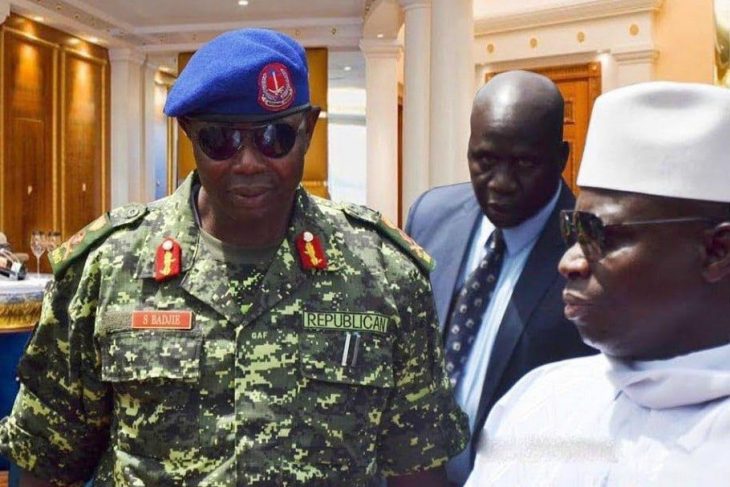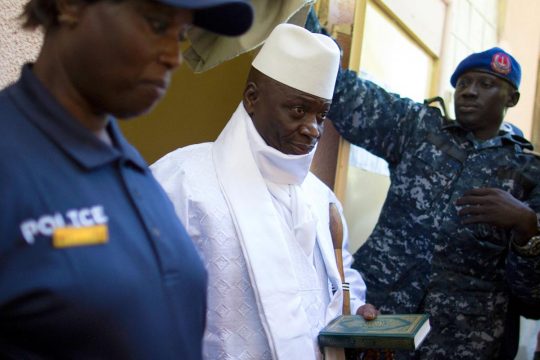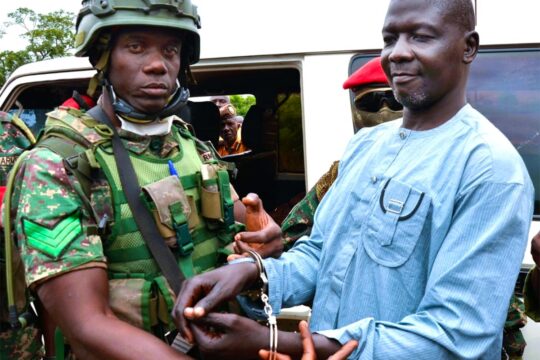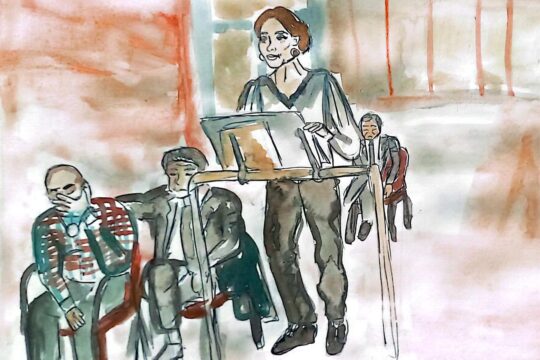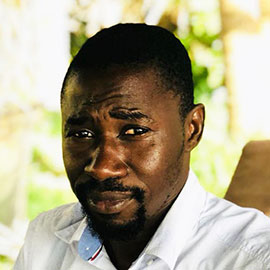In December last year an infamous right-hand man of former president Jammeh, General Sulayman Badgie, returned to the Gambia from exile in Equatorial Guinea, along with no less than eight other soldiers, four civilians and two children. Jammeh remains in Equatorial Guinea, where he appears to be protected by that country’s long-time dictator
Among the returnees, at least three— Lieutenant General Sulayman Badgie, Major Landing Tamba and Warrant Officer Class 1 Musa Badgie— were accused of serious crimes, including murder, by Gambia’s Truth, Reparations and Reconciliation Commission (TRRC).
For over a decade, General Badgie, otherwise called Saul, was a popular yet elusive figure in The Gambia. To Gambian dissidents who lived away from the reach of the dictatorship, he was the “de facto vice-president” during Jammeh’s rule. Yet very little was known about him, nor about the hit-squad—the Junglers—he reportedly led until 2016. His real name is Karafa Bojang, a native of Bwiam, a village some 17 minutes’ drive from Jammeh’s native village of Kanilai.
In 2004, Badgie became a member of a team of 30 Junglers, the second to be trained. As was revealed by investigations of the Truth, Reconciliation and Reparations Commission, the leadership of the paramilitary hit-squad was fluid. However, Badgie, who was the commander of the State Guards—an elite team guarding the Gambian President — was reportedly the overall commander of the Junglers for over a decade.
Badgie accused of summary executions
The Truth Commission found him personally liable for the murder of Mamut Ceesay, Ebou Jobe, Mustapha Colley, Tumani Jallow and Abdoulie Gaye. He was also found to have participated in the execution of nine death row inmates in August 2012. Badgie also reportedly participated in the execution of Jammeh’s one-time ally Baba Jobe and the torture of several political detainees.
Investigations by the Commission held Jammeh and General Badgie, among others, responsible for Colonel Ndure Cham’s death. In 2006, forces loyal to the former Gambian leader Jammeh foiled a coup. Jammeh was away in Mauritania. Colonel Cham, the leader of the coup who was the chief of defence staff, reportedly fled the country.
The aftermath was bloody. Several senior ranking soldiers were arrested. Intelligence chief Daba Marenah, soldiers Manlafi Corr, Ebou Lowe, Alpha Bah and Alieu Ceesay were arrested and later executed. The government announced that they had escaped as they were being transported to Janjanbureh prison.
The average Gambian thought Cham had fled the country. However, Kaddy Cham—his daughter—was secretly meeting him at his garden in Farafenni, some two hours’ drive from the Gambian capital Banjul. One day, Cham dropped out of reach. It was a testimony of Jungler Omar Jallow before the TRRC that would confirm to Kaddy what happened to her father. “I felt relieved that we knew the truth. A lot of rumours surrounded my Dad’s disappearance,” Kaddy told Justice Info.
Hosted by government
After the return of the ex-soldiers and Junglers, they were initially put in “protective custody” at a government-owned Friendship Hostel in Bakau, some 15 minutes’ drive from Banjul. But to everyone's surprise, no charges were brought against them.
The Ministry of Justice applied for the court to detain them for 90 days, purportedly pending the outcome of the White Paper due to be published on May 24. But the Ministry’s application was rejected by the High Court in Banjul on February 4, setting them free. The Ministry’s deputy director for civil litigation, Tah Kimbeng, said to Justice Info they have appealed the case. “Following the rejection of our application, the State has filed an Appeal. We are waiting for a hearing date from the Court of Appeal on this matter,” Kimbeng told Justice Info on May 10.
“The application was made for detention pursuant to a practice direction which allows the court to order the detention of a suspect who has been accused of an offence but not formally charged. This procedure has been used before in the Sanyang Riots Case and in fact in other jurisdictions such as with the five-year detention of Ousman Sonko pending the filing of formal charges before the Swiss Courts,” continued Kimbeng.
“The state’s application has no basis in law,” says lawyer Abdoulie Fatty, Solicitor at Courts of England & Wales and Barrister at the Supreme Court of The Gambia. “You cannot detain people like that without charging them.”
Critics point to deliberate attempts by the Ministry to release Badgie and others. At the end of last year, a popular member of a faction of Jammeh’s Alliance for Patriotic Reorientation and Construction party, Bakary Jaiteh, said the return of General Badgie and others were part of their condition for a potential coalition with the actual president Adama Barrow. This was never officially acknowledged.
There was a precedent, treated very differently. In 2019, two generals - Umpa Mendy and Ansumana Tamba - returned from Equatorial Guinea. They were arrested and court martialled. But they were freed on the desertion charges because they claimed they were asked by a superior, General Badgie, to accompany Jammeh.
“Therefore, now that Saul Badgie himself, who also deserted the army, is back in town, why hasn’t he been charged with desertion?” asked activist Madi Jobarteh. However, the army said they could not charge Badgie and others because their return was negotiated.
Victims Centre calls for arrest
Meanwhile, the Victims Centre, among a chorus of criticism against the government's handling of the case, in March called for the prosecution of Badgie and others.
“They should have been arrested. There should be justice. If you even let these people free, it is not safe. People are very angry. Some people can hurt them,” said Kaddy Cham.
Kimbeng, however, argued: “I know and understand the calls for prosecution, but the TRRC was a truth-seeking process and not an investigation. The findings still need to be reviewed and accepted by Government before any action can be taken. Once this process completes and the Government releases its White Paper, there will be more certainty on the way forward with regard to prosecution.”


